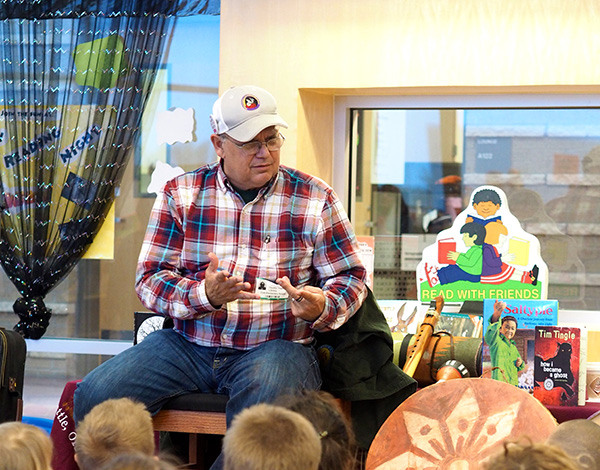Tim Tingle passes on his love for storytelling in a high-tech world

DANIEL CLIFTON • PICAYUNE EDITOR
MARBLE FALLS — If you’re a parent of a young child, you’ve probably struggled to keep your children engaged at one time or another, especially with all the technology that surrounds them.
So what do you do if you have a roomful of antsy (it’s the last part of the school day) kindergarteners?
You hope Tim Tingle is nearby. And Colt Elementary School librarian Lenore Weihs was lucky to have him on campus Nov. 12 for a series of storytelling performances.
“Kids love this type of storytelling,” Weihs said. “It just shows storytelling, whether spoken like this or in a book, still has the power to engage kids and get them excited about it.”
Tingle, a member of the Choctaw tribe, agreed. He’s been a professional storyteller and author since 1996. Since that time, he’s visited hundreds of schools, shared stories with thousands of students and offered his insights to countless adults. One thing remains: Stories remain vital to today’s society, especially those told orally.
“There’s just something about the human voice that can’t be touched by any of the technology we have,” Tingle said. “It’s that connection you as the listener develop with the teller. And, to me, that’s incredibly important today, especially between parents and kids and teachers and students.”
He wrapped up his visit to Colt Elementary with the youngest students. At this point in the day, with the end of school looming, the kids are usually ready to go home. But Tingle quickly set the tone and the right atmosphere. He set a few ground rules, getting everyone to sit “criss-cross applesauce” and remain quiet until asked to participate. (And yes, the kids do get to participate.)
Tingle started with a little bit about himself and added a few things about Native Americans that counter the typical stereotypes. At one point, he asked the children if a Native American sees a bear in the woods, how does he alert another Native American?
He then turned around and whipped out an object — a cell phone.
“We call them,” Tingle said to a roomful of laughter. “We use cell phones.”
With that, Tingle began enthralling the students with a story about a coyote, a rock, a buffalo and two hawks. The lesson was about teamwork, but as he told it, Tingle acted out the story, casting himself as each of the characters but also inviting the students to join in at certain times.
Then, he followed up with a story about a talkative rabbit with a long, beautiful tail. The talking, however, eventually cost him his tail, something still haunting rabbits today.
By the time he had wrapped up the second story, 30 minutes had flown by and the kids were hungry for more. But it was time to get ready to go home, so reluctantly, the students thanked Tingle and headed out of the library — many recounting the stories Tingle had just shared.
“Storytelling and reading are so important, especially at this age,” Tingle said after his program. “Reading just opens up so much to kids. You really can’t do anything without being able to read.”
Tingle, the author of several award-winning books geared toward children and young adults, said that during his research for one of his young adult/adult novels, he visited with four or five prison wardens in Texas and Oklahoma. One of the most important things, the wardens told him, was how necessary reading is for a future that does not include incarceration.
“One of the things each of the wardens said was one of the things that separates people from outside of prison and those inside is most of them (inside) can’t read or can’t read very well,” Tingle said. “That was amazing to me. It just shows how important reading is.”
And equally important is oral storytelling because it shares so much with the written form, but in a different style. Many cultures, such as the Native American and Appalachian, cherish oral storytelling. It’s how they passed on history, information and stories from one generation to the next. While that’s an important part of keeping oral storytelling alive, Tingle said it also has the power to “wow” and educate people, from students through adults.
He recalled that some of his teachers used oral storytelling – though they may not have called it that – when he was between fourth and seventh grades, another time Tingle believes is critical in a youth’s exposure to reading and storytelling.
“One of the teachers would read classical literature to us — like Shakespeare and Twain — in a way that it really came alive,” Tingle said. “I had a history teacher who would stand up in front of class and present a 10-minute play on the lesson we were about to study. It just made such an impact on me.”
Those two teachers laid the groundwork for Tingle’s love for those subjects, and he eventually majored in them at the University of Texas. The storytelling also stuck with him, after all, he’s become one of the most sought-after oral storytellers in the country as festivals, schools and even conferences seek him out.
Tingle said using storytelling at home with your children doesn’t have to be complicated or intimidating.
“Do it while reading a book with your child,” he said. “You don’t have to start out with a story of your own or another one you heard. Books offer a great way to get started.”
Tingle pointed out that many books written for children lend themselves to oral storytelling, so you might find yourself imitating a character’s voice or mannerisms as you read.
“You’ll just find yourself open up to that animation,” he said. “Books at that level are written for that. But most important is just reading with your kids, no matter what their age.”
Go to www.timtingle.com for more about Tingle and storytelling.
daniel@thepicayune.com


